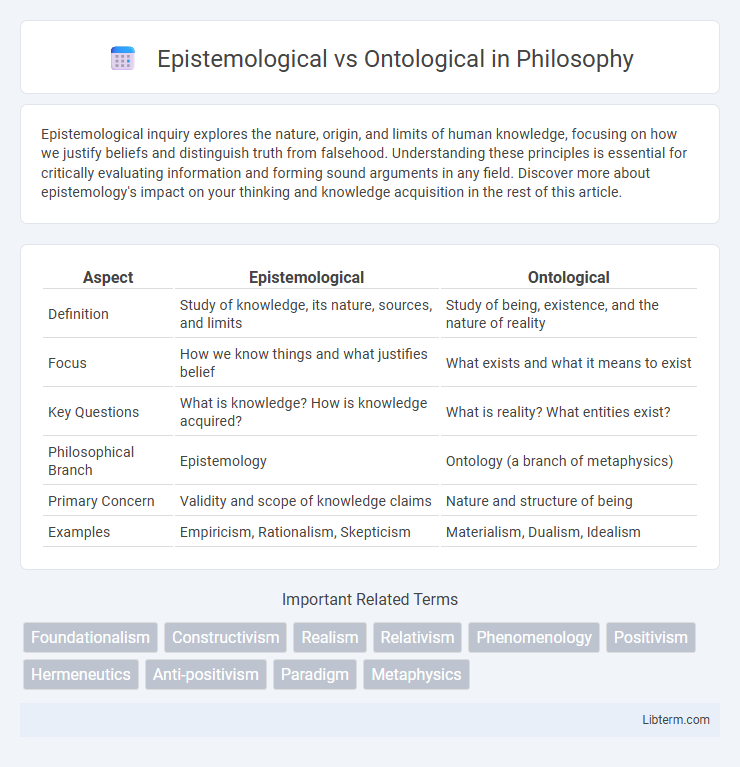Epistemological inquiry explores the nature, origin, and limits of human knowledge, focusing on how we justify beliefs and distinguish truth from falsehood. Understanding these principles is essential for critically evaluating information and forming sound arguments in any field. Discover more about epistemology's impact on your thinking and knowledge acquisition in the rest of this article.
Table of Comparison
| Aspect | Epistemological | Ontological |
|---|---|---|
| Definition | Study of knowledge, its nature, sources, and limits | Study of being, existence, and the nature of reality |
| Focus | How we know things and what justifies belief | What exists and what it means to exist |
| Key Questions | What is knowledge? How is knowledge acquired? | What is reality? What entities exist? |
| Philosophical Branch | Epistemology | Ontology (a branch of metaphysics) |
| Primary Concern | Validity and scope of knowledge claims | Nature and structure of being |
| Examples | Empiricism, Rationalism, Skepticism | Materialism, Dualism, Idealism |
Introduction to Epistemology and Ontology
Epistemology investigates the nature, scope, and limits of knowledge, focusing on how individuals acquire, justify, and validate beliefs. Ontology examines the fundamental categories of existence and reality, addressing what entities exist and how they can be grouped within a hierarchy. Together, epistemology and ontology provide essential foundations for understanding knowledge creation and the nature of being in philosophy and various scientific disciplines.
Defining Epistemology
Epistemology defines the study of knowledge, focusing on the nature, sources, and limits of human understanding and belief justification. It investigates how knowledge is acquired, validated, and distinguished from opinion or falsehood. This branch of philosophy contrasts with ontology, which centers on the study of being and existence rather than knowledge processes.
Defining Ontology
Ontology defines the nature of being, existence, and reality by categorizing entities and their relationships within a given domain. It establishes a structured framework that specifies what entities exist and how they can be grouped, subdivided, and related. Understanding ontology is crucial for disciplines like philosophy, information science, and artificial intelligence, where defining the essence of reality supports knowledge representation and interpretation.
Key Differences Between Epistemology and Ontology
Epistemology focuses on the nature and scope of knowledge, exploring how knowledge is acquired, validated, and what counts as justified belief, while ontology concerns the study of being, existence, and the categories of reality. Key differences include epistemology addressing questions about the possibility and limits of knowledge, whereas ontology investigates the nature and structure of reality itself. Epistemological inquiries examine the relationship between the knower and what can be known, whereas ontological inquiries define what entities exist independently of our knowledge or perceptions.
Historical Origins and Development
Epistemology, rooted in ancient Greek philosophy with figures like Plato and Aristotle, examines the nature, scope, and limits of knowledge, emphasizing how we know what we know through experience, reason, and evidence. Ontology, originating from metaphysical inquiries by philosophers such as Parmenides and later being systematized by Heidegger, focuses on the nature of being and existence, addressing questions about what entities exist and their fundamental categories. The historical development of both fields intertwines through the progression of Western philosophy, with epistemology evolving to address knowledge justification and ontology expanding to explore the structures of reality.
Epistemological Questions: How Do We Know?
Epistemological questions explore the nature, scope, and limits of human knowledge, asking how we acquire, justify, and validate what we know. This branch of philosophy examines the sources of knowledge such as perception, reason, memory, and testimony, emphasizing methods like empirical evidence and logical reasoning. Understanding epistemology is essential for distinguishing between belief and true knowledge within research, science, and everyday cognition.
Ontological Questions: What Exists?
Ontological questions center on the nature of existence and what entities fundamentally constitute reality, probing categories such as objects, properties, space, time, and beings. This branch of metaphysics seeks to identify what types of things exist independently and how these entities relate within a hierarchical or systematic framework. Understanding ontological questions is crucial for defining the scope of reality and grounding philosophical inquiry, as well as informing fields like artificial intelligence, metaphysics, and science about the essence of being and existence.
Relevance in Research and Philosophy
Epistemological concerns center on the nature and scope of knowledge, influencing how researchers justify beliefs and validate data, while ontological questions address the nature of reality itself, shaping the assumptions about existence in research frameworks. In philosophy, epistemology guides methods of inquiry and criteria for truth, whereas ontology underpins the conceptual structure of being and entities studied. The relevance in research lies in aligning epistemological approaches with ontological commitments to ensure coherent theory development and interpretation of findings.
Practical Applications in Various Disciplines
Epistemological frameworks guide research methodologies by determining how knowledge is acquired and validated, influencing fields like psychology and education in developing effective data collection and analysis techniques. Ontological perspectives shape the understanding of reality's nature, impacting disciplines such as sociology and artificial intelligence by defining the entities and relationships studied or modeled. Practical applications in healthcare and engineering rely on epistemological clarity for evidence-based practice and ontological precision for system design and problem-solving.
Conclusion: Integrating Epistemological and Ontological Perspectives
Integrating epistemological and ontological perspectives enhances the depth of research by combining how knowledge is acquired with what constitutes reality. This fusion allows for a more comprehensive understanding of phenomena, ensuring that assumptions about existence align with methods of inquiry. Emphasizing this integration fosters robust frameworks that address both the nature of being and the validation of knowledge.
Epistemological Infographic

 libterm.com
libterm.com